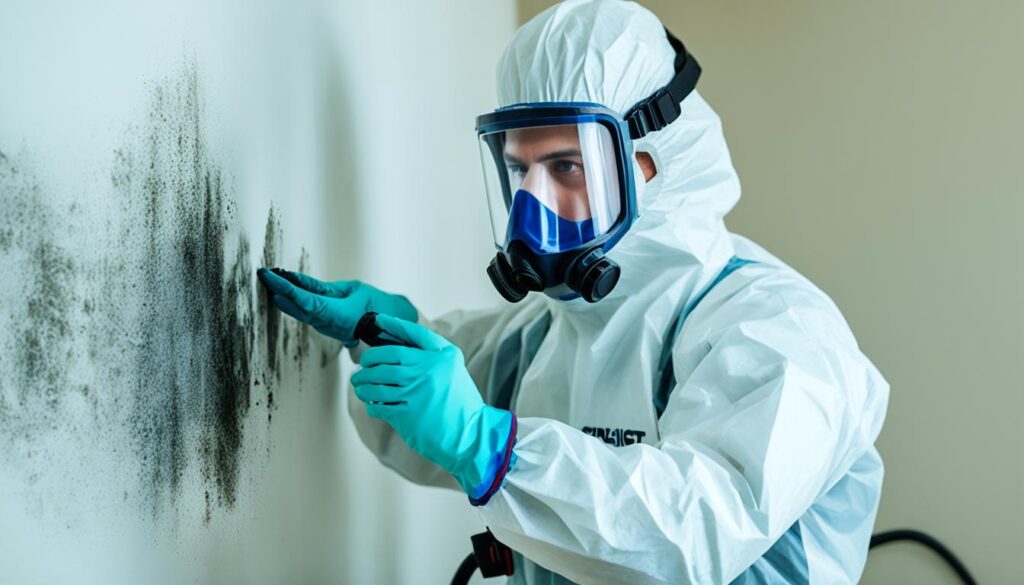
Effects & Symptoms of Breathing Mold in Florida
Mold exposure can have severe consequences on one’s health, particularly when it comes to breathing in mold spores. Florida residents, in particular, should be aware of the potential risks associated with mold inhalation due to the state’s warm and humid climate, which creates an ideal environment for mold growth.
When mold spores are inhaled, they can trigger a range of health issues, including allergies, respiratory problems, and other adverse effects. These symptoms can vary from mild to severe, depending on the individual’s sensitivity and the duration and extent of exposure.
In this article, we will explore the effects and symptoms of breathing mold in Florida. By understanding the health risks and identifying the signs of mold exposure, individuals can take proactive measures to protect their well-being and seek professional help if necessary.
Before delving into the details, let’s take a look at some key takeaways:
Key Takeaways:
- Mold exposure can have detrimental effects on your health, especially if you are breathing in mold spores.
- Florida’s warm and humid climate creates an environment conducive to mold growth, making residents more susceptible to mold-related health issues.
- Symptoms of mold exposure can range from allergies and respiratory problems to more serious health complications.
- Recognizing the signs of mold exposure is crucial for early detection and prompt remediation to minimize health risks.
- Consulting a professional mold assessment and remediation service is essential to address the issue effectively and safeguard your well-being.
Understanding Mold Exposure
Mold exposure is a common concern for many individuals, as it can have negative effects on both your health and the indoor environment. In this section, we will explore the basics of mold exposure, including what mold is, how it grows, and why it can be harmful when inhaled. By gaining a better understanding of mold exposure, you can take necessary precautions to protect yourself and your loved ones from its potential risks.
First and foremost, it’s important to know that mold is a type of fungus that thrives in moist environments. It can be found both indoors and outdoors, and it reproduces by releasing tiny spores into the air. These spores are invisible to the naked eye, making them easily inhaled by humans.
When mold spores are inhaled, they can trigger a range of health issues. For individuals with allergies or asthma, mold exposure can exacerbate symptoms and lead to respiratory distress. Even for those without pre-existing conditions, prolonged exposure to mold can cause respiratory irritation, coughing, wheezing, and throat irritation.
Furthermore, certain types of mold, such as black mold (Stachybotrys chartarum), can produce mycotoxins. These toxic substances can have severe health effects when inhaled, including neurological symptoms, fatigue, headaches, and even immune system suppression. It’s important to note that not all molds produce mycotoxins, but the presence of black mold should always be taken seriously and addressed promptly.
Preventing mold growth and addressing existing mold problems are crucial steps in minimizing mold exposure. Keeping indoor spaces dry, ensuring proper ventilation, and promptly repairing any leaks or water damage can help prevent mold from thriving. If you suspect mold growth in your home or workplace, it is recommended to seek professional mold assessment and remediation services to ensure proper cleanup and prevent further health risks.
In the next section, we will delve into the common symptoms that individuals may experience if they are exposed to mold in Florida, providing you with valuable insight into identifying potential mold-related health issues.
Common Symptoms of Mold Exposure
Mold exposure can have a significant impact on your health, with various symptoms that may arise from inhaling mold spores. Whether you reside in Florida or any other region, it’s crucial to be aware of the common signs that indicate possible mold exposure. Immediate effects can range from mild respiratory issues to severe allergic reactions, while long-term exposure can lead to chronic health problems.
Here are some common symptoms of mold exposure:
- Respiratory issues such as coughing, wheezing, and shortness of breath
- Nasal congestion, sinusitis, or frequent nosebleeds
- Throat irritation, sore throat, or hoarseness
- Allergic reactions, including sneezing, itching, and watery eyes
- Skin rashes, hives, or dermatitis
- Headaches, migraines, or dizziness
- Fatigue, weakness, or difficulty concentrating
- Digestive issues such as nausea, vomiting, or diarrhea
It’s important to note that these symptoms can vary from person to person, and some individuals may experience more severe reactions than others. Additionally, people with pre-existing respiratory conditions, allergies, or weakened immune systems may be more susceptible to the effects of mold exposure.
“Mold exposure can cause a wide range of symptoms, from mild discomfort to serious health issues. It’s crucial to address any potential mold problems promptly to prevent further complications.” – Dr. Anna Roberts, Environmental Health Specialist
If you suspect that you or your loved ones are experiencing symptoms related to mold exposure, it is advisable to consult with a healthcare professional. They can evaluate your symptoms, conduct tests if necessary, and recommend the appropriate course of action. Resolving the underlying mold issue in your living environment is equally important to ensure long-term relief.

Seeking Professional Help and Remediation
If you suspect that you are experiencing symptoms of mold exposure in Florida, it is crucial to seek professional help and remediation services. Mold can have harmful effects on your health, especially if left unchecked. Professional assistance is vital in properly assessing the extent of the mold issue and taking appropriate measures to eliminate it.
When searching for professional help, look for reputable mold assessment and remediation services in Florida. Here are a few steps to guide you in finding the right professionals:
- Ask for recommendations: Reach out to friends, neighbors, or colleagues who have previously dealt with mold issues and ask for their recommended service providers. Personal referrals can provide valuable insights and help you find trustworthy experts.
- Check certifications and experience: Ensure that the professionals you consider hiring have the necessary certifications and licenses. Look for certifications such as Certified Indoor Environmentalist (CIE) or Certified Mold Remediation Contractor (CMRC). Additionally, inquire about their experience in dealing with mold issues specifically.
- Read reviews and testimonials: Take the time to read reviews and testimonials from previous clients. Online platforms, such as Google, Yelp, or Angie’s List, can provide helpful feedback that can assist you in making an informed decision.
- Request a consultation: Contact a few mold assessment and remediation companies and request a consultation. During this consultation, discuss your specific situation, ask questions about their processes and techniques, and request a detailed cost estimate. This will allow you to compare different providers and make an educated choice.
Remember, addressing mold exposure promptly is crucial for safeguarding your well-being. By seeking professional help and remediation services, you can ensure that the mold issue is properly resolved, minimizing the risk to your health and preventing further damage to your property.
Key Factors to Consider When Selecting Mold Remediation Services
| Factors to Consider | Description |
|---|---|
| Certifications and Licenses | Verify that the professionals hold relevant certifications and licenses in mold assessment and remediation. |
| Experience and Expertise | Assess the professionals’ experience in dealing with mold issues and their level of expertise in mold remediation techniques. |
| Reputation and Reviews | Research the company’s reputation by reading reviews and testimonials from previous clients to gauge their quality of service. |
| Cost and Affordability | Compare cost estimates from multiple vendors, ensuring that the services offered align with your budget. |
| Customer Support and Communication | Evaluate the company’s responsiveness, communication skills, and willingness to address any concerns or questions you may have. |
By following these steps and considering the key factors mentioned in the table, you can make an informed decision when selecting professional help for mold exposure and remediation in Florida.

Conclusion
In conclusion, recognizing and addressing symptoms of breathing mold in Florida is crucial for maintaining your health and well-being. By understanding the potential risks and common symptoms of mold exposure, you can take proactive measures to protect yourself and your family.
If you experience respiratory issues, allergies, or any other health problems that may be linked to mold inhalation, it is important to seek professional help. Reputable mold assessment and remediation services in Florida can assist in identifying the extent of the mold problem in your home and implementing effective solutions to eradicate it.
Remember to stay informed about the effects of mold exposure and take preventive actions to minimize the risk. Keep your living spaces well-ventilated, control moisture levels, and promptly address any signs of mold growth or water damage in your home. By taking these proactive measures, you can create a healthier environment and safeguard your well-being from the potential dangers of breathing mold in Florida.




